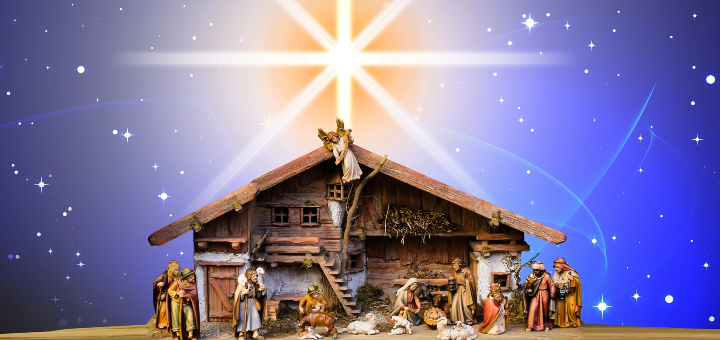
 Image credit: Pixabay.com (2016), CC0 Public Domain[/caption]
Flávia Ghelardi writes from Brazil in English and Portuguese. Jump to the English version of this post.
O Natal se aproxima e somos convidados a refletir sobre as maravilhas e ao mesmo tempo a singeleza do nascimento de Deus feito homem numa gruta, em Belém, há mais de dois mil anos. A história da nossa salvação começa na solidão desse momento único, apenas na presença de José e Maria que, profundamente comovidos, contemplavam aquele menino recém-nascido.
Quanto amor, quanta ternura envolviam esse momento! Tudo aconteceu sem barulho, sem alarde, no silêncio de uma noite feliz. A primeira lição que podemos tirar da manjedoura é a necessidade do silêncio para contemplar a Deus. Sem o silêncio, o coração é incapaz de admirar-se com os mistérios do Pai, que age e fala no silêncio. Sem silêncio não há vida interior, não há como elevar a alma para o mundo sobrenatural, é impossível encontrar a Deus. Quem foge do silêncio, foge de si mesmo, foge de Deus.
Para conseguirmos esse silêncio interior é necessário primeiro o silêncio exterior, calar os sentidos, aquietar o coração. O Papa Francisco, na Exortação Apostólica Gaudete et Exsultate nos ensina: “todos precisamos deste silêncio repleto de presença adoradora. A oração confiante é a resposta do coração que se abre a Deus face a face, onde são silenciados todos os rumores para escutar a voz suave do Senhor que ressoa no silêncio.” (GE 149) E nos convida a uma profunda reflexão: “Tens momentos em que te colocas na sua presença em silêncio, permaneces com Ele sem pressa e te deixas olhar por Ele? Deixas que o seu fogo inflame o teu coração? Se não permites que Jesus alimente nele o calor do amor e da ternura, não terás fogo, e assim, como poderás inflamar o coração dos outros com o teu testemunho e as tuas palavras?”(GE 151)
Assim, precisamos aprender a nos silenciar para nos encontramos com nosso Pai, que quer se relacionar conosco. Nosso mundo é muito agitado, temos estímulos visuais e sonoros por todos os lados, então precisamos fazer pequenas mortificações de nossos sentidos, renunciando a olhar todas aquelas fotos, aqueles vídeos, aquelas notícias. Tirando um pouco o fone de ouvido, desligando o rádio e a televisão, freando a nossa curiosidade. Isso nos ajudará a conseguirmos o silêncio necessário e a serenidade que o controle das paixões nos dá para entramos em sintonia com nosso Criador.
Outra grande lição da manjedoura é a humildade. Nosso Deus todo poderoso se humilhou assumindo nossa natureza humana, nascendo pobre, numa gruta e colocado numa simples manjedoura. Precisamos aprender a sermos humildes, seguir o exemplo de Jesus. Deus se serve dos humildes para grandes coisas.
O Papa Francisco continua ensinando: “a humildade só pode enraizar no coração através das humilhações. Sem elas, não há humildade nem santidade. Se não fores capaz de suportar e oferecer a Deus algumas humilhações, não és humilde e nem estás no caminho da santidade. (...) A humilhação faz-te semelhante a Jesus, é parte ineludível da imitação de Jesus: ‘Cristo sofreu por vós, deixando-vos um exemplo, para que sigais os seus passos.(1Pd 2,21)” (GE 118)
Peçamos nesse Natal o grande presente de aprendermos a fazer silêncio e rezar com muita introspecção e também a graça de sermos pessoas humildes e agradecidas por tantos dons e bênçãos que recebemos diariamente.
Image credit: Pixabay.com (2016), CC0 Public Domain[/caption]
Flávia Ghelardi writes from Brazil in English and Portuguese. Jump to the English version of this post.
O Natal se aproxima e somos convidados a refletir sobre as maravilhas e ao mesmo tempo a singeleza do nascimento de Deus feito homem numa gruta, em Belém, há mais de dois mil anos. A história da nossa salvação começa na solidão desse momento único, apenas na presença de José e Maria que, profundamente comovidos, contemplavam aquele menino recém-nascido.
Quanto amor, quanta ternura envolviam esse momento! Tudo aconteceu sem barulho, sem alarde, no silêncio de uma noite feliz. A primeira lição que podemos tirar da manjedoura é a necessidade do silêncio para contemplar a Deus. Sem o silêncio, o coração é incapaz de admirar-se com os mistérios do Pai, que age e fala no silêncio. Sem silêncio não há vida interior, não há como elevar a alma para o mundo sobrenatural, é impossível encontrar a Deus. Quem foge do silêncio, foge de si mesmo, foge de Deus.
Para conseguirmos esse silêncio interior é necessário primeiro o silêncio exterior, calar os sentidos, aquietar o coração. O Papa Francisco, na Exortação Apostólica Gaudete et Exsultate nos ensina: “todos precisamos deste silêncio repleto de presença adoradora. A oração confiante é a resposta do coração que se abre a Deus face a face, onde são silenciados todos os rumores para escutar a voz suave do Senhor que ressoa no silêncio.” (GE 149) E nos convida a uma profunda reflexão: “Tens momentos em que te colocas na sua presença em silêncio, permaneces com Ele sem pressa e te deixas olhar por Ele? Deixas que o seu fogo inflame o teu coração? Se não permites que Jesus alimente nele o calor do amor e da ternura, não terás fogo, e assim, como poderás inflamar o coração dos outros com o teu testemunho e as tuas palavras?”(GE 151)
Assim, precisamos aprender a nos silenciar para nos encontramos com nosso Pai, que quer se relacionar conosco. Nosso mundo é muito agitado, temos estímulos visuais e sonoros por todos os lados, então precisamos fazer pequenas mortificações de nossos sentidos, renunciando a olhar todas aquelas fotos, aqueles vídeos, aquelas notícias. Tirando um pouco o fone de ouvido, desligando o rádio e a televisão, freando a nossa curiosidade. Isso nos ajudará a conseguirmos o silêncio necessário e a serenidade que o controle das paixões nos dá para entramos em sintonia com nosso Criador.
Outra grande lição da manjedoura é a humildade. Nosso Deus todo poderoso se humilhou assumindo nossa natureza humana, nascendo pobre, numa gruta e colocado numa simples manjedoura. Precisamos aprender a sermos humildes, seguir o exemplo de Jesus. Deus se serve dos humildes para grandes coisas.
O Papa Francisco continua ensinando: “a humildade só pode enraizar no coração através das humilhações. Sem elas, não há humildade nem santidade. Se não fores capaz de suportar e oferecer a Deus algumas humilhações, não és humilde e nem estás no caminho da santidade. (...) A humilhação faz-te semelhante a Jesus, é parte ineludível da imitação de Jesus: ‘Cristo sofreu por vós, deixando-vos um exemplo, para que sigais os seus passos.(1Pd 2,21)” (GE 118)
Peçamos nesse Natal o grande presente de aprendermos a fazer silêncio e rezar com muita introspecção e também a graça de sermos pessoas humildes e agradecidas por tantos dons e bênçãos que recebemos diariamente.
Lessons from the Manger
Christmas is approaching and we are invited to reflect on the wonders and at the same time the singleness of the birth of God made man in a cave in Bethlehem, more than two thousand years ago. The story of our salvation begins in the solitude of this unique moment, only in the presence of Joseph and Mary who, deeply moved, contemplated that newborn child. How much love, how much tenderness was involved in that moment! Everything happened without noise, without fanfare, in the silence of a happy night. The first lesson we can draw from the manger is the need for silence to contemplate God. Without silence, the heart is unable to admire the mysteries of the Father, who acts and speaks in silence. Without silence there is no interior life, there is no way to raise the soul to the supernatural world, it is impossible to find God. Whoever escapes from silence, flees from himself, runs from God. In order to achieve this inner silence, it is first necessary to silence the exterior, to silence the senses, to quiet the heart. Pope Francis, in the Apostolical Exhortation Gaudete et Exsultate, teaches us:“We all have need of this silence, filled with the presence of him who is adored. Trust-filled prayer is a response of a heart open to encountering God face to face, where all is peaceful and the quiet voice of the Lord can be heard in the midst of silence.” (GE 149)And he invites us to a deep reflection:
“Are there moments when you place yourself quietly in the Lord’s presence, when you calmly spend time with him, when you bask in his gaze? Do you let his fire inflame your heart? Unless you let him warm you more and more with his love and tenderness, you will not catch fire. How will you then be able to set the hearts of others on fire by your words and witness? (GE 151)Thus, we need to learn to silence ourselves to meet our Father, who wants to relate to us. Our world is very agitated, we have visual and sound stimuli everywhere, so we need to make small mortifications of our senses, renouncing some of those photos, those videos, the news. Pulling off the headset, turning off the radio and the television, slowing our curiosity. This will help us achieve the necessary silence and serenity that the control of the passions gives us in order to get in tune with our Creator. Another great lesson of the manger is humility. Our almighty God humbled himself by assuming our human nature, being born poor, in a cave, and placed in a simple manger. We must learn to be humble, to follow the example of Jesus. God uses the humble for great things. Pope Francis continues to teach:
“Humility can only take root in the heart through humiliations. Without them, there is no humility or holiness. If you are unable to suffer and offer up a few humiliations, you are not humble and you are not on the path to holiness. (…) Humiliation makes you resemble Jesus; it is an unavoidable aspect of the imitation of Christ. For “Christ suffered for you, leaving you an example, so that you might follow in his steps” (1 Pet 2:21)” (GE 118)Let us ask this Christmas the great gift of learning to be silent and pray with much introspection and also the grace to be humble and grateful for the many gifts and blessings we receive daily.
Copyright 2018 Flávia Ghelardi
About the Author

Flávia Ghelardi
Flávia Ghelardi is the mom of four, a former lawyer already "promoted" to full time mom. Flávia published her first book FORTALECENDO SUA FAMÍLIA and is a member of Schoenstatt´s Apostolic Movement. Flávia loves to speak about motherhood and the important role of women, as desired by God, for our society. She blogs at www.fortalecendosuafamilia.blogspot.com.


.png?width=1806&height=731&name=CatholicMom_hcfm_logo1_pos_871c_2728c%20(002).png)
Comments